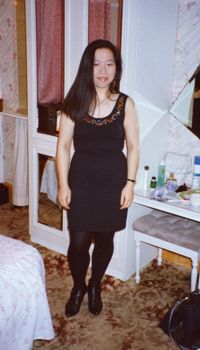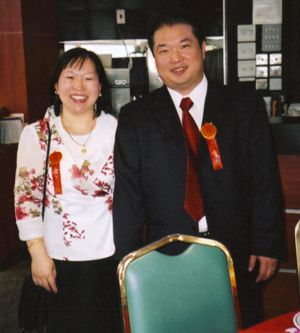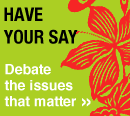Miss Hong Kong and why I am angry
I have something on my mind; a subject that won't go away and has worsened over the years from what I've seen and read. I feel angry and shake my head in disbelief...
Loud boos from the audience accompanied the crowning of the new Miss Hong Kong in July 2007. The netizens of a certain Asian website were some of the harshest critics calling her ugly, plain, chunky and chubby (she is 5'4.5" and 108 lbs.) This is outrageous to me. When did 108-pounds become the new fat and by whose standards are we judging beauty? http://asianfanatics.net/forum/index.php?showtopic=412120
You are always on my mind
 In my mid-20s on holiday in Edinburgh In my mid-20s on holiday in Edinburgh
I confess I'm a dress size or two larger than when I got married (depends on where I shop), but I'm ten years older, at the start of my fourth decade, and have given birth to two children; gravity takes over no matter how much I work out! I think I look good for my age; I don't see any wrinkles or age spots. On some levels, I feel no different to when I was in my mid-20s. Mostly, I feel good; happy in my skin and confident as a mature woman. However, why does the lack of losing the last ten pounds of weight since my daughter was born frustrate me so much?
My husband, Yiu-Yin, says he'll divorce me if I lose too much weight and become skinny! No matter how strong I am in my thoughts and how much Yiu-Yin says I look great and healthy, I still worry about my weight. A lifetime of critical comments trapped in my subconscious mind come back to trouble me. They are like little insidious voices perched on my shoulders I have spent most of my adult life reversing the negative comments about my weight from my youth. I've worked hard to enjoy my food and not be concerned if I eat one too many slices of pizza or char siu baos. Yet, at the same time as I've worked hard to achieve a good attitude, (and I'm being honest here) I still feel uncertain about my weight and my looks.
I've always felt big compared to my petite, tiny-boned and still barely 110-pounds mother. I remember her and my grandmother constantly telling me not to eat too much, to watch my weight - half a bowl of rice will do and no sweets - and to exercise. Even in the 1970s and early 1980s images of thin and glamorous Hong Kong movie stars, celebrities and models in glossy magazines exerted their influence on my mother's generation.
My mum was brutally honest and told me if she thought I looked fat in my clothes. In her mind she wasn't being harsh, but doing her best for her daughter's future. The underlying messages behind her admonitions were I wouldn't be attractive enough to get a Chinese husband if I put on weight and other opportunities would be closed off to me if I were fat.
Like many of her peers, my mum was using negative psychology to spur me to change my habits, work harder and do better. For the most part, this tactic did make me work harder and achieve success, for example in my studies. Ultimately, she wanted me to fulfill my potential, but much of the time I just longed for the words: "I think you're perfect the way you are." Western ideas of promoting self-esteem, visible and vocal praise and making people feel OK are alien to the Chinese mentality I've encountered.
Sometimes, I used to dread going to dim sum with my parents in Chinatown in the full knowledge I would get a grating comment or two about my weight if I had put on any since I last saw the person. Such comments affected me deeply as a vulnerable teenager; they seared my soul. On the surface, I acted with indifference or accepted their observations with a quiet smile. I won't elaborate on the many painful tears I shed. Suffice it to say I spent years in counselling in my twenties to nurse my fragile self-esteem.
I used to dread going back to Hong Kong when I was in my teens and twenties. Cousins whom I hadn't seen for several years would give me the third degree about my studies or my budding career; whether I'd bought a car; what designer clothes I had and, of course, they would remark outright if I'd put on weight.
 Susan & Yiu-Yin at a recent wedding Susan & Yiu-Yin at a recent wedding
I'm hardly fat; I'm a healthy size in the UK and America, but in relation to typical Hong Kong sizes I'm huge. Hong Kong is definitely a place where I feel the greatest pressure to be thin and where many of its citizens work hard to conform to images of defined beauty assigned by the media and through peer pressure.
I'm not spared when I go back to England. Much as my own self-worth tells me I look fine, I steel myself for any comments from relatives and people in the Chinese community. Call me paranoid? Perhaps, but people will tell you to your face that you've put on weight in a negative way and I've heard women being described as "a pregnant woman" long after they've given birth or they're not pregnant at all to indicate that she's considered fat.
Chinese beauty standards
Modern Chinese standards of women's beauty are hotly debated in the fashion and beauty world and, in 2005, a major Chinese website carried out an online survey to find out their readers' preferences. The responses indicated a preference for a certain height (165-170 cm) as well as "oval face, long and thick eyelashes, willowleaf-shaped eyebrows, long black straight hair, slender legs and smooth skin." http://www.chinadaily.com.cn/english/doc/2005-09/14/content_477698.htm
Another article on Chinese beauty standards lists as desirable: "big eyes, high nose, small mouth, thin figure, white teeth, duck-egg-shaped face (I have also heard people mention melon-seed-shaped face), almond eyes, long eyelashes, dark irises, dimples, small waist, long straight hair, long legs, white smooth skin, no moles or freckles, and double eyelids." http://www.cbc.ca/news/viewpoint/vp_metz/20060902.html
If we, as Chinese women, are judging ourselves by such high standards, no wonder we fall short of the mark and are severe in our critique of ourselves and other women. Likewise, if men are judging us by this long list of ideal beauty features, it would be easy to call someone who is 108-pounds fat and ugly. By the way, the research shows definitions of male attractiveness are not so defined. Women interviewed in articles were more concerned about the man's job and earning potential than about his appearance.
Standards of female beauty have changed over the years in China. In times past, fuller-figured women were considered attractive: if you were plump, it meant you could afford to eat, and would be good child bearers. There were other periods when it was fashionable to be slender or to have tiny feet. Whereas, in the past, Chinese women were embarrassed by their buxomness, now they're embarrassed if they don't have any curves.
Influence of the West
As more Asian countries do business with and have opened their doors to the West, Western perceptions of beauty have taken hold over its citizens and inform the growing debate on Asian beauty standards. Clearly the desire to have double eyelids is a direct influence of the West.
A growing number of people (mostly women) in major cities like Shanghai are turning to plastic surgery to make them look more beautiful in line with perceived Western ideals. The most requested operation is to have a second fold put in the upper eyelid to make the eye look bigger and rounder. Other popular procedures include getting a small high nose, a tummy tuck or breast augmentation. Males in cosmopolitan areas are not immune to having some sort of surgery. In a competitive world, many think this will get them a better job and attract women. http://query.nytimes.com/gst/fullpage.html?sec=health &res=9D0CE5D61538F93AA25755C0A967958260
Western influences have made their mark on Chinese perceptions of skin colour. The Chinese have always had colour snobbery: it's better for a woman to have pale, white skin rather than dark skin. Historically, this showed you were not toiling in the fields. The traditional liking for pale skin has given rise to much of the whitening creams and lotions sold in chemists over China. However, the new rich in China, including models and celebrities, want to look tanned and bronzed, which implies they have money to go on foreign holidays. http://news.bbc.co.uk/1/hi/world/asia-pacific/6357439.stm
Trends, such as plastic surgery and tanning, add fuel to the argument that ideals of external beauty in the West and East are merging.
I think both Western influences on Chinese beauty standards and Western stereotypes of the Chinese female in general have a negative impact on Chinese women's psyche.
Western media images of Chinese women portray us either as sex kittens, Suzy Wong and Geisha types, or demure, pliant and submissive China dolls (as characterized by Chinese historical perceptions of inner beauty); both images are to charm men and for men to protect or have their wicked way with us. The emphasis in all images is on a petite size and figure.
As a Chinese woman, I find such images highly insulting as they're not true representations of Chinese womanhood. The Chinese women I know form a whole spectrum of shapes, sizes and height. They're strong in mental thoughts; resilient in emotional strength, and are beautiful in their own figures. They have charming smiles; they're fun; they laugh and they're serious - in short, don't typecast us.
Eating disorders and my concerns for future generations
I think the trend in idolising ultra-thin Hollywood movie stars, celebrities, recording stars and high fashion models, especially by young people, is extremely worrying. Dress sizes 0 and 00 have entered our vocabulary and it won't be long before we have negative sizing.
Experts argue that the sharp increase in severe weight loss and rising cases of eating disorders (anorexia and bulimia) in Asian countries, once considered Western diseases, are by-products of modernisation. Confronted with images of young, thin and glamorous people in the media, today's young people strive to be ultra-thin because this equates to being rich and successful.
As a mother I want my children to grow up healthy and loving their bodies so they won't bend to intense pressures to conform to certain body types. I want them to have good self-esteem so they feel great about themselves, their abilities and physical attributes. In direct contrast to my own experiences, they'll have no doubts I think they're perfect as they are and I'll love them regardless of their size or achievements.
http://www.womensenews.org/article.cfm/dyn/aid/998
http://www.concernedcounseling.com/communities/eating_Disorders/ minorities_asia.asp
Your views
This article is based on my perceptions and experiences as a British-born Chinese woman, coupled with extensive reading over the years and many searching conversations with friends and acquaintances who are American-born Chinese and Chinese women from mainland China and Hong Kong, as well as women from other Asian countries, such as Korea and Japan.
Are Chinese women the harshest critics of our fellow sisters, prompted by impossible high standards? Are Chinese men judging us by those insane standards so they have no scruples in calling a woman chubby, chunky and ugly?
Am I wrong in my thinking? Please restore my faith we're not that shallow as a race.
Similar experiences? Let us know by posting your comments below. You can also email Susan directly here:
This email address is being protected from spam bots, you need Javascript enabled to view it
|












